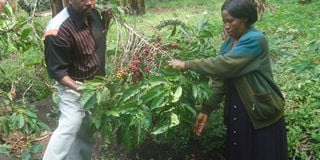Mini Farming: Kanungu couple grows coffee, earns Shs15m a year

The Busingyes pick coffee in their garden which they intercrop with banana. Photo by Otushabire Tibyangye.
What you need to know:
Alfred and Christine Busingye who live in Katungu village, Kambuga Town, Kanungu District, were teachers before they opted for agriculture. Christine narrated to Otushabire Tibyangye why they did that and how they have benefitted from growing coffee.
Both of us are teachers by profession, but we abandoned teaching to do farming because we realised that we were spending a lot of valuable time at school yet we felt our pay was not proportionate to the effort we were putting in.
We were also compelled to reach this decision because of the need to cater for a large family, which meant a huge expenditure in terms of upkeep, education and social amenities. We have 10 children, two of them have graduated from university, four are still at the university while the others are in other tertiary institutions.
My husband was the first to resign in 1990. He immediately started a retail shop dealing in general merchandise but later closed it and started growing banana in 1994.
On board
On my side, I eventually resigned in 1996 and went straight to growing coffee because I felt I had done enough study on how to grow coffee, the risks involved, and the returns.
In order to have harmony in the home, we sat down and discussed the modality and agreed that we were to work together to avoid conflict of interest.
Coffee has largely remained a man’s crop in Uganda but women are slowly breaking into business. Some organisations like NUCAFE [National Union of Coffee Agriculture and Farm Enterprise] have been involved in bringing the women on board under what they call gender equity.
We started with 100 coffee trees, which we bought at Shs50,000, and expanded to four acres after one years. Currently, we have coffee on eight acres. However, after about four years, our coffee plantation was attacked by the coffee wilt disease, which led to many trees drying up.
We had to uproot the affected trees and plant fresh ones and continued with it because of the benefits we had seen. At that time, we were harvesting 40 bags of kiboko (unshelled) coffee.
Since Robusta coffee was more prone to the wilt, to be on the safe side, we have planted three acres of Arabica coffee, which is more resistant to the wilt.
Constraints
There have been difficulties with controlling the wilt disease because the chemicals to combat it are very expensive for us. This has eaten into our earnings and has affected our savings.
Since the area has many coffee growers, most the farmers with small gardens have found it difficult to buy the chemicals as it does not make economic sense to them. So, by abandoning their affected coffee plantation in the hope of the disease controlling itself, they have instead perpetrated the spread of the wilt.
My humble appeal to government is to come to the aid of the farmers before the wilt takes a big toll on the production. The farmers should be sensitised as it has done with banana Wilt disease.
Concerns
Also, as famers we have a concern over the quality of coffee produced in the area. It has gone down as private processors have gone to the extent of buying unripe coffee due to competition. They mix this with good quality coffee because some middlemen are trying to make quick money.
We also find it difficult to access professional advice from the Uganda Coffee Development Authority because they are not readily available at famer level. They should be the ones to give us extension services.
Despite these constraints, we have made big strides by forming a cooperative society that has helped us sell coffee collectively. Most of us speak with the same voice through Kambuga Cooperatives Savings Credit Society (KCSCS). It has brought famers together more especially at marketing level. This has helped us to minimise the middlemen.
KCSCS management also gives farmer members loans, which have helped them to advance from peasant farmers to commercial farmers.
For us, we now have about 15 acres of coffee from which we reap about 80 bags of unprocessed coffee. This earns us between Shs12m to Shs15m in a year.
Our farmers have also benefitted from trainings offered by the cooperative society. Through this training, I have won trophies twice in form of farm inputs like hoes, wheel barrows and cash—Shs1m, with which I bought tarpaulins on which I dry coffee.
Future plans
As for the bananas, they are used to intercrop the coffee. When it is a good season, we sell the bananas from which we earn about Shs3m per annum.
As a way of minimising middlemen, we have persuaded other farmers in our cooperative society to raise money to buy a huller, which will not only process the coffee but also enable farmers to get the husks, which can be used as manure in the banana plantations.
At home, we are now able to meet most of the obligations. We have educated our children up to university or tertiary level, and put up a good house and installed solar power, among others.
Our future plans include rearing pigs, goats, chicken and beekeeping all of which we have started experimenting with.




